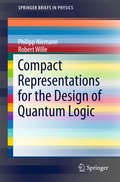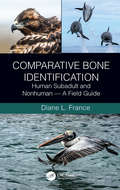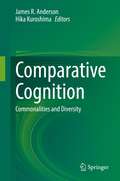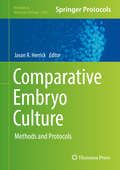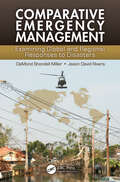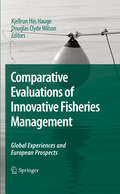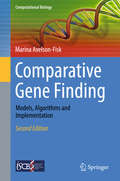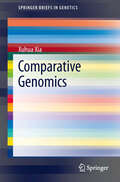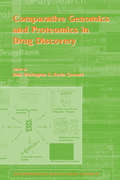- Table View
- List View
Compact Regs Part 58: CFR 21 Part 58 Good Laboratory Practice for Non-clinical Laboratory Studies 10 Pack, Second Edition
by Interpharm CrcThis publication contains a verbatim reproduction of 21 CFR Part 58 Good Laboratory Practice for Nonclinical Laboratory Studies.
Compact Representations for the Design of Quantum Logic (SpringerBriefs in Physics)
by Robert Wille Philipp NiemannThis book discusses modern approaches and challenges of computer-aided design (CAD) of quantum circuits with a view to providing compact representations of quantum functionality. Focusing on the issue of quantum functionality, it presents Quantum Multiple-Valued Decision Diagrams (QMDDs - a means of compactly and efficiently representing and manipulating quantum logic. For future quantum computers, going well beyond the size of present-day prototypes, the manual design of quantum circuits that realize a given (quantum) functionality on these devices is no longer an option. In order to keep up with the technological advances, methods need to be provided which, similar to the design and synthesis of conventional circuits, automatically generate a circuit description of the desired functionality. To this end, an efficient representation of the desired quantum functionality is of the essence. While straightforward representations are restricted due to their (exponentially) large matrix descriptions and other decision diagram-like structures for quantum logic suffer from not comprehensively supporting typical characteristics, QMDDs employ a decomposition scheme that more naturally models quantum systems. As a result, QMDDs explicitly support quantum-mechanical effects like phase shifts and are able to take more advantage of corresponding redundancies, thereby allowing a very compact representation of relevant quantum functionality composed of dozens of qubits. This provides the basis for the development of sophisticated design methods as shown for quantum circuit synthesis and verification.
Compact Slot Array Antennas for Wireless Communications (Signals and Communication Technology)
by Alan J. SangsterThis book describes and provides design guidelines for antennas that achieve compactness by using the slot radiator as the fundamental building block within a periodic array, rather than a phased array. It provides the basic electromagnetic tools required to design and analyse these novel antennas, with sample calculations where relevant. The book presents a focused introduction and valuable insights into the relevant antenna technology, together with an overview of the main directions in the evolving technology of compact planar arrays. While the book discusses the historical evolution of compact array antennas, its main focus is on summarising the extensive body of literature on compact antennas. With regard to the now ubiquitous slot radiator, it seeks to demonstrate how, despite significant antenna size reductions that at times even seem to defy the laws of physics, desirable radiation pattern properties can be preserved. This is supported by an examination of recent advances in frequency selective surfaces and in metamaterials, which can, if handled correctly, be used to facilitate physics-defying designs. The book offers a valuable source of information for communication systems and antenna design engineers, especially thanks to its overview of trends in compact planar arrays, yet will also be of interest to students and researchers, as it provides a focused introduction and insights into this highly relevant antenna technology.
Compact Star Physics
by Jürgen Schaffner-BielichThis self-contained introduction to compact star physics explains important concepts from areas such as general relativity, thermodynamics, statistical mechanics, and nuclear physics. Containing many tested exercises, and written by an international expert in the research field, the book provides important insights on the basic concepts of compact stars, discusses white dwarfs, neutron stars, quark stars and exotic compact stars. Included are sections on astrophysical observations of compact stars, and present and future terrestrial experiments related to compact stars physics, as the study of exotic nuclei and relativistic heavy-ion collisions. Major developments in the field such as the discovery of massive neutron stars, and a discussion of the recent gravitational wave measurement of a neutron star merger are also presented. This book is ideal for graduate students and researchers working on the physics of compact stars, general relativity and nuclear physics.
Companion Animal Economics
by Daniel Mills Sophie Hall Luke Dolling Katie Bristow Ted FullerSuccinct, highly readable and thought provoking, this important new text is designed to raise awareness of the potential economic impact of companion animals in the UK. It discusses the potential benefits and costs of companion animals to the economy and highlights the need for this matter to be thoroughly researched, given the potential scale of impact and the potential costs of ignoring this matter. The book includes: - case studies to illustrate the savings to the NHS that might be associated with companion animal ownership; - links to up-to-date tables and content that might form templates for use in other countries; and - highly readable information written by expert authors and key opinion leaders in the field. Inspired by the seminal Council for Science and Society (CSS) Report, Companion Animals in Society (1988), this work updates and extends its evaluation of the economic impact of companion animals on society and lays a benchmark for future development. This pivotal new book is important for policy makers at national and international levels and all those involved in animal welfare.
Companion Encyclopedia of Science in the Twentieth Century
by Dominique PestreWith over forty chapters, written by leading scholars, this comprehensive volume represents the best work in America, Europe and Asia. Geographical diversity of the authors is reflected in the different perspectives devoted to the subject, and all major disciplinary developments are covered.There are also sections concerning the countries that have made the most significant contributions, the relationship between science and industry, the importance of instrumentation, and the cultural influence of scientific modes of thought. Students and professionals will come to appreciate how, and why, science has developed - as with any other human activity, it is subject to the dynamics of society and politics.
Companion to Environmental Studies
by Mike Hulme Noel Castree James D. ProctorCompanion to Environmental Studies presents a comprehensive and interdisciplinary overview of the key issues, debates, concepts, approaches and questions that together define environmental studies today. The intellectually wide-ranging volume covers approaches in environmental science all the way through to humanistic and post-natural perspectives on the biophysical world. Though many academic disciplines have incorporated studying the environment as part of their curriculum, only in recent years has it become central to the social sciences and humanities rather than mainly the geosciences. ‘The environment’ is now a keyword in everything from fisheries science to international relations to philosophical ethics to cultural studies. The Companion brings these subject areas, and their distinctive perspectives and contributions, together in one accessible volume. Over 150 short chapters written by leading international experts provide concise, authoritative and easy-to-use summaries of all the major and emerging topics dominating the field, while the seven part introductions situate and provide context for section entries. A gateway to deeper understanding is provided via further reading and links to online resources. Companion to Environmental Studies offers an essential one-stop reference to university students, academics, policy makers and others keenly interested in ‘the environmental question’, the answer to which will define the coming century.
Comparative Anatomy of the Mouse and the Rat: A Color Atlas and Text
by Gheorghe M. ConstantinescuKey features:Beautifully illustrated with detailed, full-colour images - very user-friendly for investigators, students, and technicians who work with animalsProvides essential information for research and clinical purposes, describing some structures not usually shown in any other anatomy atlasIn each set of illustrations, the same view is depicted in the mouse and the rat for easy comparisonText draws attention to the anatomical features which are important for supporting the care and use of these animals in researchEndorsed by the American Association of Laboratory Animal Science (AALAS)Comparative Anatomy of the Mouse and Rat: a Color Atlas and Text provides detailed comparative anatomical information for those who work with mice and rats in animal research. Information is provided about the anatomical features and landmarks for conducting a physical examination, collecting biological samples, making injections of therapeutic and experimental materials, using imaging modalities, and performing surgeries.
Comparative Biogeography: Discovering and Classifying Biogeographical Patterns of a Dynamic Earth
by Lynne R. Parenti Malte C. EbachTo unravel the complex shared history of the Earth and its life forms, biogeographers analyze patterns of biodiversity, species distribution, and geological history. So far, the field of biogeography has been fragmented into divergent systematic and evolutionary approaches, with no overarching or unifying research theme or method. In this text, Lynne Parenti and Malte Ebach address this discord and outline comparative tools to unify biogeography. Rooted in phylogenetic systematics, this comparative biogeographic approach offers a comprehensive empirical framework for discovering and deciphering the patterns and processes of the distribution of life on Earth. The authors cover biogeography from its fundamental ideas to the most effective ways to implement them. Real-life examples illustrate concepts and problems, including the first comparative biogeographical analysis of the Indo-West Pacific, an introduction to biogeographical concepts rooted in the earth sciences, and the integration of phylogeny, evolution and earth history.
Comparative Biology of Aging
by Norman S. WolfThe processes of aging and death remain one of the most fascinating, and mysterious, areas of biological research. Huge anomalies between species raise questions the answers to which could have fundamental implications for the field of medical science. As scientists unlock the secrets of the exceptionally long-lived little brown bat (up to 34 years), or the common budgerigar, for example, which despite having a metabolic rate 1.5 times that of a laboratory mouse, can live for up to 20 years, it has become more important than ever to be able to make a comparative analysis of the various species used in research. Dealing with every one of the mammalian species that are employed in laboratory research, this is the first book on the subject of aging that provides detailed comparative data for age-related changes in its subjects. It does so at the level of the whole animal, its organs, organelles and molecules. The comparative data, supplied in 15 chapters by leading experts, provides information on fields as disparate as telomere function and loss, the importance of the Sirtuins and Tor, the influence of hormones on lifespans, the relationship between body size and lifespan, the effects of restricted calorific intake, age-related changes in cell replication, and DNA damage and repair. Chapters are devoted to cardiac aging, comparative skeletal muscle aging, the aging of the nervous and immune systems, the comparative biology of lyosomal function and how it is affected by age, and many other key areas of research. This much-needed text will provide scientists working in a wide spectrum of fields with key data to aid them in their studies.
Comparative Bone Identification: Human Subadult and Nonhuman - A Field Guide
by Diane L. FranceBuilding on the success, and maintaining the format, of Comparative Bone Identification: Human Subadult and Non-Human (ISBN: 9780367777883), Comparative Bone Identification: Human Subadult and Non-Human – A Field Guide presents new images of human bones representing many states of maturation from neonate to 20 years old in comparison to a variety of animal species’ bones. Highly illustrated, the book takes a visual approach and provides full annotations pointing out salient features of the most commonly discovered bones. This includes smaller bones of fetuses and subadult humans in comparison to bones of birds, reptiles, marine mammals, fish, and a frog that human bones may most be confused with. Full-color photos provide clear examples for use by law enforcement, medicolegal death investigators, forensic anthropologists, students, and readers who wish to distinguish between human bones and those of a variety of animal species. The book is not intended to be an exhaustive guide to human and nonhuman skeletons. It offers myriad photos and illustrations to help aid in identification and avoid some of the more commonly confused animal bones for human. The book begins with an introduction section on general osteology and explains the major anatomical differences between humans and other animals. The second section compares human and nonhuman bones, categorized by type of bone, and includes most of the major bones in humans and nonhumans. The third section presents of radiographs illustrated documented age in humans. Conveniently designed for field use, Comparative Bone Identification: Human Subadult to Nonhuman – A Field Guide offers users a practical comparative guide that presents the differences among species for nearly all bones in the body. The book serves as a valuable resource of easy-to-access information to investigators and forensic anthropologists for use in the laboratory or in the field.
Comparative Bone Identification: Human Subadult to Nonhuman
by Diane L. FranceBuilding on the success, and maintaining the format, of the best-selling Human and Nonhuman Bone Identification: A Color Atlas (ISBN: 978-1-4200-6286-1), Comparative Bone Identification: Human Subadult to Nonhuman presents new images of human bones representing many states of maturation from neonate to 20 years old. It also extends the scope of the former work by focusing on the smaller bones of fetuses and young humans and comparing them to bones of birds, reptiles, marine mammals, fish, and a frog that may be confused with those of a subadult human. The book begins with a section on general osteology and explains the major anatomical differences between humans and other animals. The second section compares human and nonhuman bones, categorized by type of bone, and includes most of the major bones in humans and nonhumans. The third section presents skeletons within species. Containing nearly 3,500 color photographs, the book provides examples of similar bones in nonhuman species that may be confused with the human bone in question. The bone images are also taken from different angles to enhance detailed understanding. A practical comparative guide to the differences among species for nearly all bones in the body, this book is a valuable resource for the laboratory or in the field. It uses a visual approach with annotations pointing out salient features of the most commonly discovered bones, giving clear examples for use by law enforcement, medicolegal death investigators, forensic anthropologists, students, and readers who wish to distinguish between human bones and those of the a variety of animal species.
Comparative Cardiovascular Dynamics of Mammals
by John K-J LiComparative Cardiovascular Dynamics of Mammals offers never-before-published data on the structure and function of the circulatory systems of the different mammalian species. This text explores classic allometry, dimensional analysis, and modern hemodynamics to establish similarity principles that provide a necessary and important step in understanding the natural common design and functional features of the cardiovascular systems of different mammals.Fluid and blood vessel mechanics, pulse transmission characteristics, cardiac energetics and mechanics, as well as heart-arterial system interaction are included in this essential reference. The sensitivity of parameters and similarity of principles in the diagnosis of cardiovascular diseases are also addressed. This book also describes the natural processes involved in the functional development of the mammalian cardiovascular system.By using modern methods to present recent findings on the similarities and differences of the mammalian cardiovascular system, the author provides an easily understood approach to this dynamic field of study.
Comparative Climate Change Litigation: Beyond the Usual Suspects (Ius Comparatum - Global Studies in Comparative Law #47)
by Makane Moïse Mbengue Francesco SindicoThis book is based on the acknowledgment that climate change is a multifaceted challenge that requires action on the part of all stakeholders, including civil society, and the notion that climate change is at a tipping point with urgent measures needed in the next decade. Against this background, civil society is turning its attention to the courts as a means to directly influence climate action, partly because of the global scepticism towards the progress of global climate action, despite the ongoing implementation of the Paris Agreement. Focusing on the individual, broadly representing civil society, the book offers fresh perspectives on climate change litigation.While most of the literature on climate change litigation examines the same specific jurisdictions, mostly common law countries (US and Australia in particular), this book also considers specific countries in Asia, Africa and Latin America with little or no climate change litigation. It explores the reasons for the lack of litigation and discusses what measures should or could be taken to change this situation and push forward climate action. Unlike other literature on the subject, this book analyses climate change litigation using a scenario-based methodology. Combining rigorous academic analysis with a practical policy-oriented focus, the book provides valuable insights for a wide range of stakeholders interested in climate change litigation. It appeals to civil society organisations around the world, international organisations and law firms interested in climate change litigation.
Comparative Cognition
by Mary C. Olmstead Valerie A. KuhlmeierIntegrating developments from psychology, ethology and neuroscience, this is an undergraduate introduction to cognitive processes across species. The authors merge classic studies and contemporary research to give students a full picture of the evolving field of comparative cognition. Engaging students in the discipline from its roots in animal learning and evolutionary biology through to current research, the chapters cover both controlled laboratory and comparative cross-species studies in the natural environment. This approach provides students with complementary ethological and neurobiological perspectives on cognition. Feature boxes encourage active and engaged learning, giving a deeper understanding of topics discussed in the main text. These are supported by end-of-chapter questions to check understanding and encourage wider thinking around topics. Online resources include solutions to questions in the book, advanced material, PowerPoint lecture slides and additional questions, all available at www. cambridge. org/cognition.
Comparative Cognition: Commonalities and Diversity
by James R. Anderson Hika KuroshimaThis book presents an overview of selected topics in comparative cognition, which is the study of behaviour and mental activities in nonhuman animals. Human psychological capacities are often used as a heuristic by comparative cognitive scientists, whose tasks include designing valid procedures for studying species’ sensory, linguistic or manipulatory abilities that differ from those of humans. Nonetheless, researchers have developed many original ways to gain insights into how other species perceive the world, store and integrate information, and communicate. The contributors to this book have all been involved in such work, and will present some of the approaches that have led to clear advances in our understanding of cognitive processes in other species. The chapters integrate a review of past literature with recent work, covering a variety of subject species including birds, domestic dogs and cats, and nonhuman primates. All contributors have worked with or been otherwise influenced by Professor Kazuo Fujita, to whom the volume will be dedicated. Fujita’s openness to research on various topics and species is reflected in the diversity of the chapters presented.The book will be of interest to students and more experienced researchers in diverse fields including psychology, anthropology, biology and veterinary studies.
Comparative Ecology of Microorganisms and Macroorganisms (Contemporary Bioscience Ser.)
by John H. AndrewsThe most important feature of the modern synthetic theory of evolution is its foundation upon a great variety of biological disciplines. -G. L. STEBBINS, 1968, p. 17 This book is written with the goal of presenting ecologically significant anal#65533; ogies between the biology of microorganisms and macroorganisms. I consider such parallels to be important for two reasons. First, they serve to emphasize that however diverse life may be, there are common themes at the ecological level (not to mention other levels). Second, research done with either microbes or macroorganisms has implications which transcend a particular field of study. Although both points may appear obvious, the fact remains that at#65533; tempts to forge a conceptual synthesiS are astonishingly meager. While unify#65533; ing concepts may not necessarily be strictly correct, they enable one to draw analogies across disciplines. New starting points are discovered as a conse#65533; quence, and new ways of looking at things emerge. The macroscopic organisms ('macroorganisms') include most represen#65533; tatives of the plant and animal kingdoms. I interpret the term 'microorganism' (microbe) literally to mean the small or microscopic forms of life, and I include in this category the bacteria, the protists (excluding the macroscopic green, brown, and red algae), and the fungi. Certain higher organisms, such as many of the nematodes, fall logically within this realm, but are not discussed at any length.
Comparative Embryo Culture: Methods and Protocols (Methods in Molecular Biology #2006)
by Jason R. HerrickThis detailed volume contains embryo culture techniques that should inspire embryologists to consider comparative studies. The species included in this volume represent a broad range of taxa, whose embryos have vastly different culture requirements and developmental characteristics. Among the species described in this volume, significant differences exist in the rates of cell division, the timing of the maternal to embryonic transition, the relative lipid content of the cytoplasm, the sensitivity of the embryo to specific environmental ions, the preferred nutrients and associated metabolic pathways used by the embryo, the timing and mechanisms of early lineage specification, the presence or absence of embryonic diapause, and the time from fertilization to implantation. Written for the highly successful Methods in Molecular Biology series, chapters include introduction to their respective topics, lists of the necessary materials and reagents, step-by-step, readily reproducible protocols, and tips on troubleshooting and avoiding known pitfalls. Authoritative and practical, Comparative Embryo Culture: Methods and Protocols serves as an ideal aid for scientists seeking another species whose embryos have evolved a unique mechanism that could provide a valuable, comparative context for experimentation.
Comparative Emergency Management: Examining Global and Regional Responses to Disasters
by Jason David Rivera DeMond Shondell MillerA host of natural and man-made disasters have plagued the world in the twenty-first century, many with significant global impact. The Deepwater Horizon Oil Spill, the Indian Ocean tsunami, and Hurricane Katrina all affected broad regions with devastating results. The need for better emergency management policies, procedures, and cooperation among n
Comparative Entrepreneurship Education
by Xiaozhou XuThis book systematically compares the innovation and entrepreneurship education (IEE) in the United States, the United Kingdom, Finland, Germany, Croatia, Canada, South Korea, and China. The book invites the most distinguished professors of each country in this field to contribute. It provides a context analysis that can lead to greater insight into why and how IEE has become an important government agenda and an institutional priority in different country settings. Following the context, each chapter analyzes governmental policies and the guidance of entrepreneurship education in recent years. This book also analyzes the internal development and supporting system of IEE from an ecosystem perspective. Based on the comparison of case countries, the book puts forwards the common successful experience and the differentiation of IEE.
Comparative Environmental Politics
by Stacy D. Vandeveer Paul F. SteinbergHow do different societies respond politically to environmental problems around the globe? Answering this question requires systematic, cross-national comparisons of political institutions, regulatory styles, and state-society relations. The field of comparative environmental politics approaches this task by bringing the theoretical tools of comparative politics to bear on the substantive concerns of environmental policy. This book outlines a comparative environmental politics framework and applies it to concrete, real-world problems of politics and environmental management. After a comprehensive review of the literature exploring domestic environmental politics around the world, the book provides a sample of major currents within the field, showing how environmental politics intersects with such topics as the greening of the state, the rise of social movements and green parties, European Union expansion, corporate social responsibility, federalism, political instability, management of local commons, and policymaking under democratic and authoritarian regimes. It offers fresh insights into environmental problems ranging from climate change to water scarcity and the disappearance of tropical forests, and it examines actions by state and nonstate actors at levels from the local to the continental. The book will help scholars and policymakers make sense of how environmental issues and politics are connected around the globe, and is ideal for use in upper-level undergraduateand graduate courses.
Comparative Evaluations of Innovative Fisheries Management: Global Experiences and European Prospects
by Kjellrun Hiis Hauge Douglas Clyde WilsonComparative Evaluations of Innovative Fisheries Management begins with a look at four places outside the European Union known for innovative management: New Zealand, Nova Scotia, Alaska and Iceland. Then the focus shifts to the success criteria related to specific disciplines including biological and social robustness, economic efficiency and impacts on management costs. Hypotheses are tested using data capable of generating useful results. The main conclusions include a retrospective of how key concepts defined and represented the various perspectives, skills and backgrounds that made up the multidisciplinary CEVIS project.
Comparative Gene Finding: Models, Algorithms and Implementation (Computational Biology #20)
by Marina Axelson-FiskThis book presents a guide to building computational gene finders, and describes the state of the art in computational gene finding methods, with a focus on comparative approaches. Fully updated and expanded, this new edition examines next-generation sequencing (NGS) technology. The book also discusses conditional random fields, enhancing the broad coverage of topics spanning probability theory, statistics, information theory, optimization theory and numerical analysis. Features: introduces the fundamental terms and concepts in the field; discusses algorithms for single-species gene finding, and approaches to pairwise and multiple sequence alignments, then describes how the strengths in both areas can be combined to improve the accuracy of gene finding; explores the gene features most commonly captured by a computational gene model, and explains the basics of parameter training; illustrates how to implement a comparative gene finder; examines NGS techniques and how to build a genome annotation pipeline.
Comparative Genomics (SpringerBriefs in Genetics)
by Xuhua XiaThis book provides an evolutionary conceptual framework for comparative genomics, with the ultimate objective of understanding the loss and gain of genes during evolution, the interactions among gene products, and the relationship between genotype, phenotype and the environment. The many examples in the book have been carefully chosen from primary research literature based on two criteria: their biological insight and their pedagogical merit. The phylogeny-based comparative methods, involving both continuous and discrete variables, often represent a stumbling block for many students entering the field of comparative genomics. They are numerically illustrated and explained in great detail. The book is intended for researchers new to the field, i.e., advanced undergraduate students, postgraduates and postdoctoral fellows, although professional researchers who are not in the area of comparative genomics will also find the book informative.
Comparative Genomics and Proteomics in Drug Discovery: Vol 58 (Society for Experimental Biology)
by John Partington Kevin CowardComparative Genomics and Proteomics in Drug Discovery gives an overview of how emerging genomic and proteomic technologies are making significant contributions to global drug discovery programs, and in particular the key role that comparative genomics and proteomics play within this strategy. Each chapter is written by respected authorities, with hands-on experience, from both academic and pharmaceutical backgrounds.

